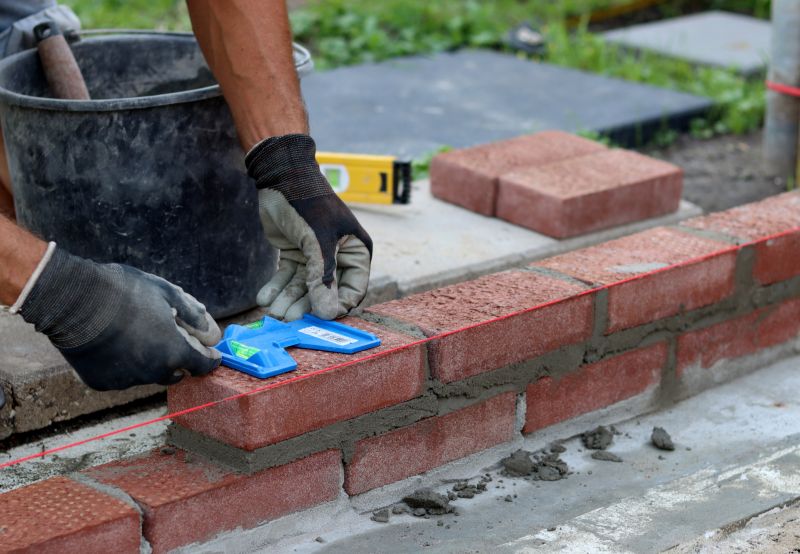Leading Products For Brick Masonries Professionals
Explore essential tools and materials that enhance efficiency, quality, and durability in brick masonry projects.
 Brick masonry is a timeless construction technique that requires a variety of specialized products to ensure durability, precision, and aesthetic appeal. Whether undertaking a small repair or a large-scale project, having the right tools and materials is essential for achieving professional results. From mortar mixes to trowels and jointing tools, the array of products available can seem overwhelming. Selecting quality items suited to your specific needs can make the process more efficient and lead to a more satisfying finished product.
Brick masonry is a timeless construction technique that requires a variety of specialized products to ensure durability, precision, and aesthetic appeal. Whether undertaking a small repair or a large-scale project, having the right tools and materials is essential for achieving professional results. From mortar mixes to trowels and jointing tools, the array of products available can seem overwhelming. Selecting quality items suited to your specific needs can make the process more efficient and lead to a more satisfying finished product.
Top Overall Option
Mortar Mixing and Application Kit
A comprehensive mortar mixing and application kit provides all the essential components for preparing and applying mortar efficiently. It typically includes durable mixing buckets, high-quality trowels, and jointing tools designed for ease of use and precision. This versatile kit is suitable for various masonry projects, offering consistency and reliability in mortar preparation and application.
Types of Products For Brick Masonries
Mortar Mixes
Pre-blended mortar mixes formulated for different types of brickwork and environmental conditions.
Trowels
Various trowel designs including pointing, margin, and bricklaying trowels for applying and shaping mortar.
Jointing Tools
Tools used to finish and smooth mortar joints for a clean, professional look.
Brick Cutters
Manual or powered tools designed to cut bricks accurately and efficiently.
Leveling Devices
Tools such as spirit levels and laser levels to ensure even and straight brick courses.
Scaffolding
Support structures that provide safe access to elevated work areas.
Safety Gear
Protective equipment including gloves, goggles, and dust masks for worker safety.
Waterproofing Sealants
Products applied to brick surfaces to prevent water infiltration and damage.
Brick Hammers
Tools used for shaping and splitting bricks during installation.
Brushes and Sponges
Cleaning tools for finishing mortar joints and surface cleaning.
Mortar Rakes
Tools for removing old mortar during repair or repointing projects.
Chisels
Various chisels for detailed shaping and cutting of bricks and mortar.
Measuring Tapes and Rulers
Precision measuring tools for layout and alignment.
Concrete and Masonry Saws
Power tools for cutting bricks, blocks, and stones with accuracy.
Mortar Pumps
Mechanical devices to facilitate the delivery of mortar in large projects.
Brick Laying Guides
Templates and guides to assist in consistent brick placement.
Popular Choices
Widely used tools for applying and smoothing mortar during bricklaying.
Small, precise trowels ideal for detailed mortar finishing.
Commonly used for splitting and shaping bricks in various projects.
Popular for ensuring level and aligned brick courses over large areas.
Frequently used for removing old mortar during repair work.
Essential for safe access during high or extensive brickwork.
Common safety gear to protect hands from sharp edges and mortar.
Popular for sealing brick surfaces against moisture intrusion.
Power tools favored for precise and efficient brick cutting.
Used for cleaning and finishing mortar joints for a polished look.
Widely used for accurate project measurements and alignments.
Replacement blades for cutting tools used in brick projects.
Popular for mixing large quantities of mortar efficiently.
Helpful for quick checks of brick course levels.
Commonly used for detailed shaping and splitting bricks.
Standard protective gear for eye safety during masonry work.
In brick masonry, the choice of mortar is fundamental. Mortar binds bricks together and influences the strength and appearance of the finished wall. Different formulations are available to accommodate various environmental conditions and aesthetic preferences. Proper mixing and application are crucial to ensure that the mortar sets correctly and provides a strong bond.
Tools such as trowels, jointers, and pointing tools are designed to facilitate precise application and finishing. Ergonomically designed tools can reduce fatigue during extended work sessions, while durable materials ensure longevity and consistent performance. Additionally, safety gear like gloves, goggles, and dust masks help protect workers from potential hazards associated with masonry work.
Advanced products like brick cutting saws, scaffolding, and leveling devices can enhance productivity and accuracy. These tools help in achieving clean cuts, level surfaces, and safe working environments. Investing in high-quality equipment tailored to brick masonry tasks can significantly improve overall project quality and efficiency.
Key Buying Considerations
- Material compatibility: Ensure products are suitable for the specific type of bricks and mortar you are using.
- Durability: Choose tools and materials that can withstand the demands of masonry work over time.
- Ease of use: Select ergonomic designs that reduce fatigue and improve precision.
- Project scale: Match product sizes and capacities to the scope of your project.
- Safety features: Prioritize safety gear and tools with protective features to prevent injuries.
- Versatility: Consider multi-purpose tools that can handle various tasks within brick masonry.
- Compatibility with other tools: Ensure that accessories and parts fit well with existing equipment.
- Ease of maintenance: Opt for products that are simple to clean and maintain for longevity.
- Budget considerations: Balance quality and cost to find the best value for your needs.
- Brand reputation: Research product reviews and reputation for consistent performance.
- Availability of replacement parts: Check if spare parts are accessible for ongoing maintenance.
- Environmental conditions: Select products that perform well in your specific climate or working environment.
- Storage and portability: Consider how easy it is to store and transport tools and materials.
- Compliance with safety standards: Ensure products meet relevant safety and quality standards.
- Compatibility with project timeline: Choose reliable products that support your schedule.
This page contains affiliate links. We may earn a commission if you make a purchase through these links, which helps support our content creation.
